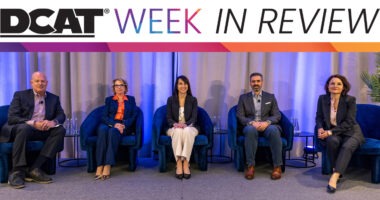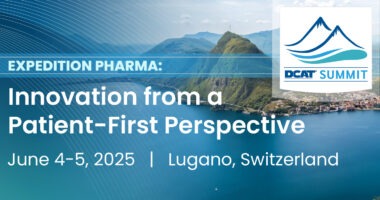CDMO M&A: What Are The Important Moves?
As we near the fourth quarter of 2022, what have been the key mergers and acquisitions thus far in 2022 in the CDMO/CMO sector and what new CDMOs/CMOs have entered the market? DCAT Value Chain Insights takes a look.
Change of ownership; mergers and acquisitions
Catalent’s pending $475-million acquisition of Metrics Contract Services. Last month (August 2022), Catalent agreed to acquire Metrics Contract Services, a Greenville, North Carolina-based CDMO of oral solid dosage products, including high-potency products, for $475 million.
Metrics, part of Mayne Pharma, an Adelaide, Australia-based bio/pharmaceutical company, has a 333,000-square-foot facility in Greenville, North Carolina. The facility includes 16 manufacturing suites, with 11 designed to handle highly potent compounds, and two packaging lines. The facility’s estimated annual production capacity exceeds one billion oral solid dose units. With the acquisition, Metrics’ entire team of over 400 employees will join Catalent.
Mayne Pharma and Catalent also agreed on the terms of a five-year supply agreement, whereby the Greenville facility will continue to manufacture multiple Mayne Pharma products. The transaction is expected to close by the end of calendar year 2022.
MilliporeSigma reorganizes its CDMO business under new operating model, completes major acquisition. Earlier this year (2022), Merck KGaA, the parent company of MilliporeSigma, completed its $780-million acquisition of Exelead, a bio/pharmaceutical CDMO that specializes in complex injectable formulations, including lipid nanoparticle-based drug-delivery technology. The business combination is expected to enable MilliporeSigma to provide end-to-end CDMO services across the mRNA value chain. Merck KGaA plans to further invest over EUR 500 million ($567 million) to scale up Exelead’s technology over the next 10 years (as reported on February 23, 2022).
In April (April 2022), Merck KGaA launched several organizational changes and a new operating model for its life-sciences businesses. Effective April 1, 2022, existing CDMO and contract testing services were consolidated into one global organization, Life Science Services, for traditional modalities, such as monoclonal antibodies and high-potency active pharmaceutical ingredients (APIs), and novel modalities, such as antibody drug conjugates and viral and gene therapies, along with the respective sales and marketing, R&D, manufacturing, and supply-chain operations. Its non-CDMO activities under the new operating model include its Process Solutions business unit and the Science and Lab Solutions business unit. The Process Solutions business unit provides filtration devices, chromatography resins, single-use assemblies and systems, processing chemicals, and excipients. The Science and Lab Solutions business combines the research solutions and applied solutions business units into one organization.
Novasep, PharmaZell Merge To Create New CDMO. This year (2022) also saw the completion of the merger of two CDMOs: Novasep, a Lyon, France-based CDMO of APIs and antibody drug conjugates, and PharmaZell, a Raubling, Germany-based CDMO of small-molecule APIs. The companies announced the completion of the merger in April (April 2022). The companies had entered exclusive negotiations for the merger in September 2021. The combined company has a footprint in Europe, the US, and India with combined revenues of nearly EUR 500 million ($545 million) and more than 2,000 employees across 10 production and R&D sites: seven in Europe, two in India, and one in the US.
CordenPharma in growth mode, change of ownership. CordenPharma, a CDMO of APIs and drug products, announced a change of ownership in May (May 2022), reporting that the European private-equity firm, Astorg, would acquire the company, from International Chemical Investors Group (ICIG), an investment company with holdings in fine chemicals and chemicals. The deal is subject to customary regulatory approvals.
CordenPharma has more than 250 pharma and biotech customers across five technology platforms: peptides; lipids & carbohydrates, including lipids for mRNA vaccines and therapeutics; highly potent & oncology; injectables; and small molecules.
CordenPharma added to its drug-product manufacturing capabilities earlier this year (2022) with the acquisition of three facilities from Vifor Pharma, a Saint Gallen, Switzerland-headquartered specialty pharmaceutical company. CordenPharma first announced the acquisition last December (December 2021) and completed the acquisition in March (March 2022). The acquisition of the facilities, two facilities in Switzerland (Ettingen and Fribourg) and one in Portugal (Amadaro), expanded CordenPharma’s capabilities and capacities in the manufacturing of non-sterile drug-product dosage forms, including but not limited to, oral solid-dosage forms such as tablets and capsules. With the addition of these three new facilities, CordenPharma’s global network now consists of 12 locations (11 GMP manufacturing sites and 1 R&D laboratory).
The acquisition of the three Vifor Pharma manufacturing sites is one part of CordenPharma’s larger growth plans as the company targets EUR 1 billion ($1.1 billion) in sales in the coming years. The bolt-on acquisition complements CordenPharma’s strategic expansion investment of EUR 100 ($110) million per year over two years to increase manufacturing capacity at facilities in CordenPharma Frankfurt (Germany), Chenôve (France), and Plankstadt (Germany) as well as new service offerings at CordenPharma Chenôve (France) and Caponago (Italy).
Recipharm enters the biologics/advanced therapy space. Led by CEO Marc Funk, formerly CEO of Lonza, who took over as CEO of Recipharm in 2021, Recipharm, a CDMO of drug substances and drug products, is increasing its position in biologics, with a particular focus on drug-substance manufacturing of advanced therapy medicinal products.
In April (April 2022), Recipharm completed the acquisitions of Vibalogics, a CDMO of oncolytic viruses, viral vector vaccines, and viral vectors, and Arranta Bio, a CDMO of live biotherapeutic products and products of the human microbiome. Recipharm had announced the acquisitions in February (February 2022). Vibalogics is a manufacturer of oncolytic viruses, viral vaccines and gene therapies and provides process and analytical development, manufacturing, testing, and fill–finish services from facilities in Cuxhaven, Germany, and Boxborough, Massachusetts. Arranta Bio is progressing the first build-out phase of laboratory and GMP capacity at a second commercial-ready site in Boxborough, Massachusetts, which is slated to be completed by mid-2022.
In addition, earlier this year (February 2022), Recipharm acquired GenIbet, an Oeiras, Portugal-based biologics CDMO of recombinant proteins, cell and gene therapies, RNA, live microbial products, and vaccines. GenIbet was founded in 2006 as a spin-off of iBet Instituto de Biologia Experimental e Tecnológica, a private organization specializing in biotechnology research and bioprocess development.
The company’s move into biologics comes as it cuts back on small-molecule API capacity. In January 2022, Recipharm divested the former Aesica Pharmaceuticals’ small-molecule API manufacturing facility in Cramlington, UK, near Newcastle, UK, to Pharmaron, a Beijing-based R&D service provider for the life-sciences industry. Recipharm acquired Consort Medical, the parent company of Aesica, a CDMO of APIs and drug products, and Bespak, a CDMO of drug devices, for £505 million ($629 million) in 2020 and with it, Aesica’s API manufacturing facility in Cramlington, UK.
New CDMOs enter the market
Euroapi, a Sanofi spin-off, launches as a stand-alone CDMO. One of the more interesting moves thus far in 2022 was the launch of Euroapi, a CDMO of small-molecule active pharmaceutical ingredients (APIs) spun off from Sanofi as a stand-alone publicly traded company. Sanofi says it expects the new manufacturing company to bring in EUR 1 billion ($1.05 billion) in sales in 2022 and that the stand-alone CDMO will rank number one in small-molecule APIs and number two in the global API market. The company began trading on the Euronext Paris stock exchange in early May (May 2022).
Sanofi had announced its plan to form the stand-alone CDMO in February 2020. The new company combines Sanofi’s API commercial and development activities from six of its European production sites: Brindisi, Italy; Frankfurt, Germany; Haverhill, UK; St. Aubin les Elbeuf, France; Vertolaye, France; and Újpest, Hungary. Euroapi has a portfolio of approximately 200 APIs over the six sites. In 2021, the business posted net sales of EUR 892.8 million ($941.7 million). Karl Rotthier, formerly CEO of Centrient Pharmaceuticals, a Rotterdam, the Netherlands-based manufacturer of intermediates and APIs, was named as CEO of Euroapi, effective January 2021.
Euroapi launched with financial backing from Sanofi. Sanofi established a long-term customer relationship with Euroapi and committed to holding a minority stake of approximately 30% in the CDMO for a two-year lock-up period (as reported in May 2022). In addition, EPIC Bpifrance, a French public investment bank owned by the French government, agreed to purchase 12% of EuroAPI’s shares from Sanofi and committed to a two-year lock-up period, and L’Oréal, Sanofi’s largest shareholder, committed to a one-year lock-up period (as reported in May 2022).
When first announcing the launch of the new CDMO in 2020, Sanofi said that the new European company will help balance “the industry’s heavy reliance on API sourced from other regions” while simplifying Sanofi’s industrial footprint. At the end of 2021, Sanofi conducted industrial production at 67 sites in 31 countries. As of December 31, 2021, Euroapi represented approximately 1% of the total consolidated assets of Sanofi, mainly in the form of dedicated industrial facilities at the chemicals sites included in the spin-off and API inventories manufactured and commercialized by Euroapi.
Pharmira Launches as Shionogi-backed CDMO. Although on a smaller scale, another CDMO of APIs launched this year (April 2022) is Pharmira, a joint venture (JV) among Shionogi Pharma, the CDMO business of Shionogi Pharma, an Osaka, Japan-based bio/pharmaceutical company, and Fujimoto Chemicals Co., an Osaka, Japan-based manufacturer of APIs and intermediates, along with five other Japanese companies. The companies established the JV in November 2021 and began the business on April 1, 2022.
Shionogi Pharma is the principal stakeholder with a 50.1% stake, and Fujimoto Chemicals holds a 10.0% stake. The other five companies in the JV are involved in facility construction and operations and are: Chiyoda Corporation, a Kanagawa, Japan-based engineering and construction company (17.0% stake); Taisei Corporation, a Tokyo-based an engineering and construction company (15.9% stake); Takenaka Corporation, an Osaka, Japan-based general contractor (5.3% stake); Yokogawa Electric, a Tokyo, based provider of advanced technologies and products for measurement, control, and information support (1.1% stake); and Nagase & Co., a Tokyo-based importer/exporter of chemical products (0.7% stake).
Continuous manufacturing is a specialty focus of the CDMO JV, which will use both batch and continuous manufacturing and provide process development and manufacturing on a clinical and commercial scale. Upon its introduction, continuous manufacturing will be applied mainly to reaction and crystallization processes.
SPAC eureKING targets European biologics CMDO market. Although private investors, through private-equity firms, have been a part of the CDMO sector, relatively newer to the sector are special purpose acquisition companies (SPACs). A SPAC is a company that has no commercial operations and is formed strictly to raise capital through an initial public offering (IPO) or for the purpose of acquiring or merging with an existing company. As an investment vehicle, SPACs are not new, but their popularity has soared in recent years. A new entry in the CDMO sector is eureKING, a SPAC focused on investing in biologic-based CDMOs, mainly in Europe. eureKING launched an IPO in May (May 2022) on Euronext Paris with the aim of raising EUR 150 million ($158 million).
eureKING was founded in March 2022 by eureKARE, an investment firm focused on financing and building companies in the fields of synthetic biology and the microbiome, Its founders include seven industry executives, including its CEO, Michael Kloss, former Chairman and CEO of Panasonic Healthcare and former Chairman and CEO of Ascencia Diabetes Care (formerly part of Bayer), and Gérard Le Fur, Chairman, eureKING, and former CEO of Sanofi-Aventis. Also, among the others founders is Christophe Jean, Strategic Partner of the private equity fund, Oraxys Environment, who held several executive positions in Novartis, Ipsen, and Pierre Fabre.
eureKING’s plan is to invest in biologics CDMOs in three main areas: (1) the production of biologics, in particular new generations of monoclonal antibodies or complex proteins; (2) the production of cell and gene therapies; and (3) the production of live biotherapeutics (with applications in the microbiome).
The company says it will seek to invest in biopharmaceutical CDMOs that can offer a variety of services across the biopharmaceutical value chain, including drug-product development (e.g., sourcing and specimen manufacturing), drug-substance manufacturing (e.g., extraction and synthesis) and drug-product manufacturing (e.g., formulation and commercial production).
In deciding to target the biologics CDMO sector, eureKING cites the fragmented nature of the biologics CDMOs market, noting that large players occupy only about 27% of the market, and the opportunity to target other CDMOs, noting that the CDMO market consists of thousands of companies, two-thirds of which have revenues of less than $50 million.






